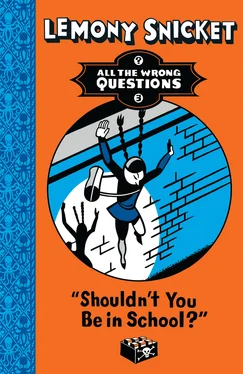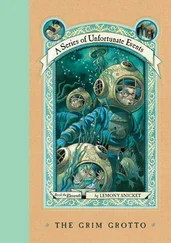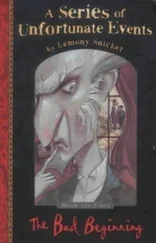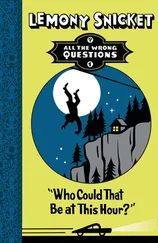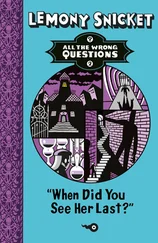“All right then, Snicket.”
I sat down and then stood up again. “You know my name, but I don’t know yours. That doesn’t seem fair.”
“It’s Kellar,” the boy said. “Kellar Haines.”
“Well, Kellar Haines,” I said, “shouldn’t you be in school?”
Kellar had been ready to start typing again, but now he blinked and looked down at his fingers. They were trembling a little bit. “Yes,” he said, and there was something about the way he said it, quiet and sad, that made me see the two of us a little differently.
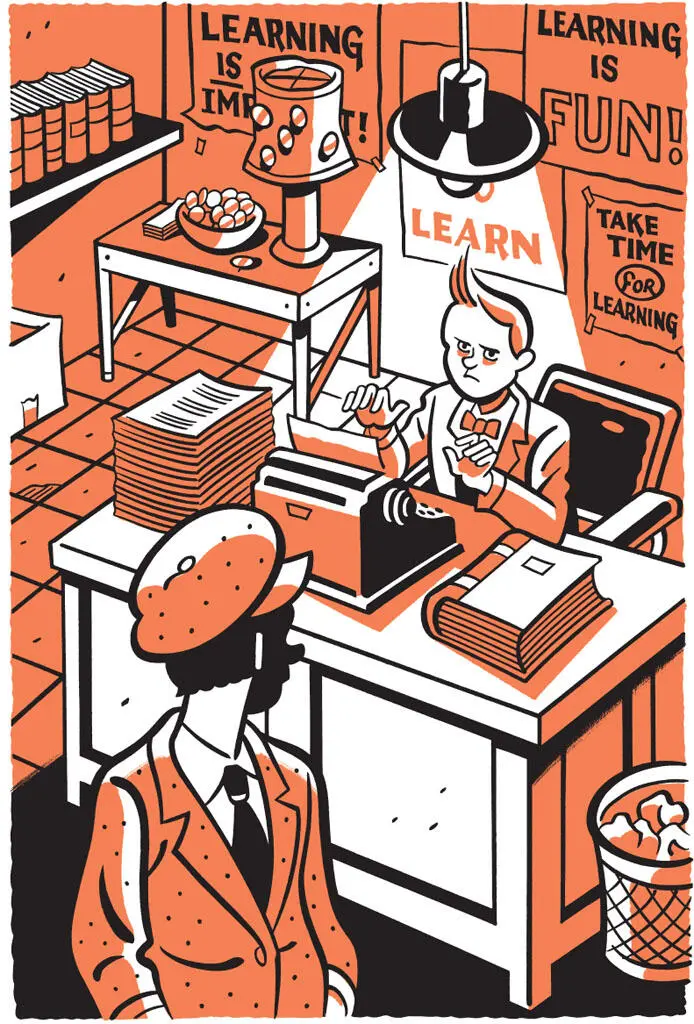
The door swung open again, and the woman with the lime pin came out and looked at us at last. Then she looked at Kellar Haines. Then she looked behind her and then she smiled nervously and then she began to speak.
“Good morning” is what she said. “I’m Sharon Haines. I work here, which is the Department of Education. Yes, that is what it is.”
“I’m S. Theodora Markson,” said S. Theodora Markson, “and never mind who this is.”
“Lemony Snicket,” I said.
“This is my son Kellar,” Sharon said, “and never mind him, either.”
Sharon gave a little nod to indicate Kellar, and Theodora gave a little nod in my direction. Then they both smiled, Theodora first and Sharon after a few seconds, like a mirror running late.
“Perhaps we should talk in your office,” I said.
“Yes, of course,” Sharon said, leading us to the swinging door, and then she gave a sort of gasp. “No, let’s just sit here, shall we? The Department of Education is very busy today. Very busy. And my desk gives me some kind of medical condition. My tongue swells up if I sit there too long, and I end up talking like my mouth is full of baby mice.”
She sat down between us, and I watched Theodora nodding seriously at Sharon the way one adult has nodded at the nonsense of another adult since the first adult walked on the earth. “I think I have a medical condition, too,” Theodora said. “Lately when I’m driving my roadster I have the peculiar sensation of everything being quieter than it should be.”
“That could be because your helmet covers your ears,” I said.
The two women looked at me the way you look at a leaky pen. I looked down at the floor. There was an ugly rug with ugly triangles on it in an ugly pattern. Underneath, I thought, were the rectangular marks I’d seen in the photograph. I wondered what was covering the floor in the office, on the other side of the flimsy wall. Desks, chairs. Whatever all those muttering people kept in their office.
“Perhaps I’d better tell you about the case,” Sharon said, and she went to her son’s desk and took something out of a drawer. It was a photograph, but we couldn’t see it. It was facedown, and she left it that way in her lap when she sat back down. She sighed and looked behind her. Behind her was a wall. “There is a villain,” she said, “who is putting every schoolchild in town in terrible danger.”
I knew it, I thought.
Sharon gave us a long look. Kellar went type-type-type. “We have had some dealings with such a villain,” I said. “It would probably be best not to say his name.”
“It’s Hangfire,” Theodora explained.
Type-type-stop.
“Hangfire,” Sharon repeated with a frown. “What do you know about him?”
“Not much,” Theodora said. “He’s violent and treacherous. You know the kind of man I mean.”
“Yes, I do,” Sharon said, with a nervous smile. Kellar started typing again. “I had a boyfriend like that in eighth grade.”
“Me too!” Theodora was using a tone of voice I hadn’t heard from her before. I regret to say that I’d have to describe it as a squeal. “He was always saying impolite things about my hair.”
“Well,” Sharon said, “I think it looks nice.”
“Well,” Theodora said, “I think you’re nice.”
“Nevertheless,” I said, spoiling the party, “we’re here to talk about Hangfire.”
Sharon sighed again and rattled her fingers on the photograph. “Recently a local business was burned to the ground,” she said. “Birnbaum’s Sheep Barn caught fire in the middle of the night, and there was scarcely enough time to evacuate the sheep. The fire was not an accident. It was a crime.”
Theodora turned to me. “She means arson,” she explained, unnecessarily. You could not become an apprentice without knowing what arson is. You could not even start to study for an apprenticeship without knowing “arson.” I even knew the original Latin term from which the word “arson” was derived.
“We’ll assign this case extra-crucial status,” Theodora said to Sharon, using an expression that meant absolutely nothing.
“I appreciate that,” Sharon said. “As luck would have it, there was a witness to the fire, and I’m hoping you and your apprentice will go interview this man and see if he can tell you anything.”
“A witness!” Theodora cried. “ Aha! ”
“For instance,” Sharon continued, “he might say the arsonist had an unusual jacket, so it would help you find him and capture him.”
“Unusual jacket! Aha! ”
Theodora looked at me triumphantly, but I saw nothing triumphant about an imaginary jacket mentioned by a witness we hadn’t met yet.
“Who is this witness?” I asked.
Sharon’s eyes widened and she moved her hands up and down, over and over, like she couldn’t decide whether or not to remove her ears. She looked over at her son and then down at her collar, and then she cleared her throat and answered my question at last. “Harold Limetta is his name.”
“Harold Limetta?”
“Yes, Harold Limetta. I believe his name is Italian, although he lives here in town at 421 Ballpoint Avenue, walking distance from the library.”
“We’ll take my car,” Theodora said. “Thank you for meeting with us, Ms. Haines.”
“Call me Sharon,” Sharon said, “and call me the minute you have an update.”
“Of course I will,” Theodora said. “After all, our progress is being evaluated.”
Kellar stopped typing for a second and shared a look with his mother I didn’t quite understand, but every family has a look they give each other that makes no sense to anybody else. “Yes,” Sharon agreed, when the look was over. “Our progress is being evaluated. Do you have any more questions?”
“Yes,” Theodora said. “How can I reach you outside of office hours?”
“I’ll give you my number,” Sharon promised. “I must say, I didn’t expect so much kindness and understanding from such a prestigious investigator.”
“It is you who are prestigious,” Theodora said. “Come along, Snicket. We’re done here. Let’s head on over to Harold Limetta’s house.”
I was still staring at the photograph turned upside down on the desk. “I have a question,” I said. “Why are schoolchildren in danger because a barn burned down?”
Sharon sat up in her chair and straightened the creases on the coat she was wearing. I didn’t like the coat and I didn’t like its creases. “The Department of Education takes its mission very seriously,” she said to me. “Even one schoolchild in danger is a terrible thing. Children are the future of the world, and we must keep them safe from harm. Every night I tremble thinking about how I’d feel if something terrible happened, even if it happened to somebody I did not know.”
I made myself nod. I’d heard every word the woman had said, but I didn’t mistake it for something that made sense. Her fingers slipped under the edge of the photograph, and she slowly began to turn it over. “If this jacketed villain burned down a barn,” she said, “it stands to reason that he’d burn down a school.” She leaned forward and looked very sternly at me. “I can guarantee you, young man, that it will probably happen. If you don’t believe me, take a good, long look at this!”
Читать дальше
